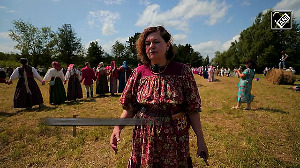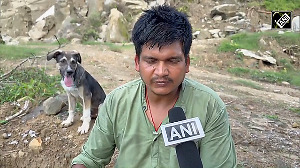Years ago, as finance minister, Manmohan Singh popularised the term 'systemic failure.'
Today he appears to believe it is a case of individuals being at fault rather than the system. I believe he was wrong then and is wrong now, says T V R Shenoy.
Earlier in our series celebrating 60 years of Parliament:
Aakar Patel: Parliament's role in making India a great nation is over
Subhash Kashyap: People feel that for our MPs the nation comes last
Arvind Kejriwal: MPs are bonded labor of their parties
Shashi Shekhar: Nothing diminishes the fact that we are a Great Nation
Rajeev Srinivasan: Parliament: Is it worse than it looks?
Suresh Prabhu: The glue that keeps the country together
About fifty years ago, when I was a student at the University of Bombay, one of the Political Science faculty was moved to make a bitter quip on seeing a photograph of an 'election' in the now happily defunct Soviet Union. The photo showed a Soviet citizen depositing what looked like a sealed envelope into the ballot box's slot. This, according to him, is how the dialogue went:
Soviet voter: 'Tell me Comrade Official, can I open the envelope before I deposit my vote in the box?'
Stern Soviet official: 'Certainly not, Comrade! We must maintain the secrecy of the ballot!
The point was that the process was a sham, an empty ritual bereft of meaning.
Technically, yes, each citizen had cast his or her ballot just as they did in actual democracies. Technically, yes, each vote would be counted. But it was all so much play-acting because the voters had no idea whose name was on the ballot that they had just cast; that all-important decision would be taken by a Politburo sitting behind closed doors.
On May 13, 2012, India marked the sixtieth anniversary of parliamentary democracy. Many fine speeches were heard both in the Lok Sabha and in the Rajya Sabha. But at the end of it all there was a nagging feeling that something was missing. We still have a Parliament, but do we truly have a 'parliamentary democracy'?
There is a gulf in time that separates us from the authors of the Constitution. You have to remember that by 1947 each of those elected to what became the Constituent Assembly had spent literally a lifetime of observing the British system of governance, the so-called 'Westminster model'.
This meant that all of them might have taken certain things for granted, issues that are simply not as clear cut any longer as they might have seemed sixty years ago. And it is my contention that we have drifted -- are continuing to drift -- farther and farther away from the Westminster model.
So, what are the salient features of the Westminster model? The British constitution is an unwritten document, as much a combination of tradition, precedent, and shared historical experiences as it is of strict legislation. Let me point to three features of the British constitution, all of which would have been familiar to the authors of our own Constitution because they took place well before 1947.
First, the Cabinet operates under the doctrine of 'collective responsibility', and under the direction of the prime minister. Second, the prime minister is the man or woman that has received the mandate of the people through an election. Third, the prime minister sits in the Lower House, the House of the People, because that is the Parliamentary chamber that, being itself directly elected, has the power to make or unmake ministries.
Each of these three principles evolved over a period of centuries, but they were all firmly in place by 1947, so much so that the authors of our Constitution saw no need to mention them specifically in their great work.
By general reckoning, the first British prime minister was Sir Robert Walpole, who took office in 1721 and continued to govern up to 1742. But it was the king that was the effective head of government, not the nominal prime minister. In practice this meant that ministers could continue in office even as prime ministers came and went.
By 1801, however, politics had evolved to the point where every minister resigned along with William Pitt the Younger. The archaic phrase 'serves during the pleasure of the monarch' continues but in Britain no minister can continue given the displeasure of the prime minister.
The second key element of the Westminster model -- requiring the people's mandate -- was established after the elections of 1880. In the previous general election, held in 1874, the Conservatives had won a massive mandate, getting 350 seats to the 242 won by the Liberals. Gladstone, the defeated Liberal prime minister, then left all his party posts, leaving the Liberal leadership in Parliament to Hartington in the Commons and Granville in the Lords.
Gladstone came roaring back into active politics, infuriated by what he thought was an immoral foreign policy conducted by the Conservatives. In 1880 Gladstone's campaign reversed the 1874 result, the Liberals winning 352 to the Conservatives' 237 seats. Queen Victoria, who disliked both Gladstone and his policies, invited Hartington and Granville to form the government. Both declined on the ground that Gladstone alone had the mandate.
The third element -- that the prime minister must belong to the Lower House -- was established in 1922. When Bonar Law, the then prime minister, was diagnosed with cancer, there were two possible replacements -- the chancellor of the exchequer, Stanley Baldwin, and the foreign secretary, Lord Curzon. Baldwin became prime minister because even the Conservatives recognised that it was no longer possible for a prime minister to sit in an Upper House that was not directly elected by the people of the country.
Which of these three basic principles of parliamentary governance has not been violated in India?
Collective responsibility and the authority of the prime minister are regularly violated, as we learned when A Raja's allocation of spectrum came under the microscope. The power of Dr Manmohan Singh's office has been diluted because the man himself does not possess a popular mandate, something arguably possessed only by Sonia Gandhi and her Yuvraj, under whom the Congress and its UPA partners fought elections.
Finally, Dr Manmohan Singh has never been elected from any constituency to the house of the people. (Never won as much as a Panchayat seat in a popular election as a matter of fact!)
We can call ourselves the world's largest democracy, but the Indian system would not be recognised as a true democracy in Westminster, nor even in systems as different as those of Germany or the United States.
India has clearly violated basic tenets of democracy, namely that the electorate has the last word in choosing its chief executive and that other members of the executive wing report to the head of government.
In 2005 Germans knew that Angela Merkel would be chancellor if they voted the Christian Democrats to power. In 2010 Britons knew that David Cameron would be prime minister if they voted the Conservatives into power. In 2004 which Indian voter was told that Dr Manmohan Singh would be installed at Race Course Road if the Congress won power?
May I suggest a few specific reforms (with no great hope that they shall ever be enacted)?
First, amend the Constitution to insist that the prime minister be a member of the Lok Sabha.
Second, insist that any group recognised by the Election Commission as a 'national party' should identify its leader before a general election. The present drift in governance cannot be halted except by someone who has the authority of someone vested with the popular mandate.
I listened with great interest to the speeches made in Parliament on May 13. Many -- Dr Manmohan Singh, L K Advani, Pranab Mukherjee -- spoke movingly of the way that disruptions interrupted the business of Parliament, and called for introspection. The tenor of their words seemed to be that the problem lay in individuals rather than the system.
Years ago, as finance minister, Dr Manmohan Singh popularised the term 'systemic failure', a catch-all exculpation of individual failure. Today the prime minister appears to believe that it is a case of individuals being at fault rather than the system. I believe he was wrong then and is wrong now. Yes, individuals may be at fault, but let us not pretend that our system is flawless.
You can read more columns by Mr T V R Shenoy here






